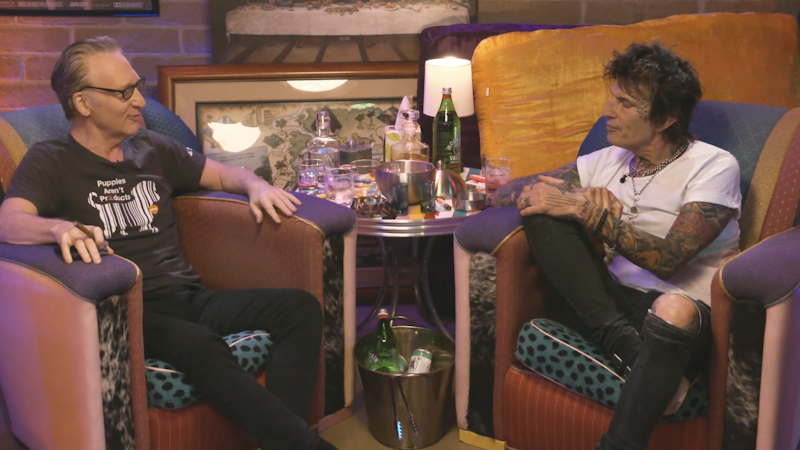“What I find objectionable about the philosophy of the strike… it seems to be, they have really morphed a long way from 2007’s strike, where they kind of believe that you’re owed a living as a writer, and you’re not. This is show business. This is the make-or-miss league.” Bill Maher’s comments last month about the then still unresolved WGA strike reached millions of people and angered many of them, but they didn’t come from Twitter, nor his HBO show Real Time (now back). Maher said the above on Club Random, a video podcast on YouTube that he’s hosted since March 2022. The first episode debuted the same night as the Oscars with guest Quentin Tarantino. I remember watching that when Will Smith slapped Chris Rock—and what struck me was how quickly Maher got loaded.
Club Random is, like Maher, painfully uncool but dynamic and unpredictable, unlike nearly all media in the United States. The show is a bit of Dick Cavett and 1970s Johnny Carson, Maher’s hero and the man who gave him the nod back in the 1980s. “Johnny” comes up a lot on Club Random, because the guest is never really the focus. Maher sits across from someone for an hour, an hour and a half, maybe two, just talking, often disagreeing, never storming out or getting too heated. This is what’s refreshing about the show and why I still find myself listening to it in the background every Sunday. Club Random is shot in one of several buildings on Maher’s property, a party house where Carrot Top saw, “Florence Henderson doing rails over there.” Maher laughs, fiddles with his “clove cigarette,” gets out his Zippo, waits to light it…
Because Maher’s Politically Incorrect and Real Time have always stood alone for simply putting people next to people and asking them to talk about the news. Why shouldn’t Rachael Leigh Cook’s opinion on abstinence matter as much as Dennis Prager, or John Waters and Christopher Hitchens on the imminent invasion of Afghanistan? Maher has always been out of step, one of the few major American media stars that’s never been welcomed into a club and distorted. Howard Stern craved the acceptance of Hollywood for years, abandoned his audience, and finds himself obscure and irrelevant in his old age; Real Time is one of the few shows on HBO that still gets ratings when it actually airs.
Tim Heidecker, along with Fred Armisen, produced a parody of Club Random a couple of months ago. He hits every refrain: “Did you find the place? We don’t want people knowing where we are…” “40 years ago, we only had three channels,” “It’s like that time on Gilligan’s Island.” It’s remarkable how often Gilligan’s Island comes up on Club Random, only because the guests will prompt Maher—usually, he’s the one repeating himself. “What are you drinking?” Heidecker’s parody is on point, but like so much of his comedy, is as empty and mean-spirited as Maher’s political commentary.
Club Random is a relatively candid look into the mind of a man in his 60s, living large in Hollywood, at the top of his game professionally and still culturally relevant. Yet he’s miserable, and it’s not because he’s unmarried and doesn’t have any kids. There are a hundred or so episodes of Club Random, and they’re all more revealing of Maher than their guests, famous people spanning all fields from James Carville, Jay Leno, Aaron Rodgers, John Waters, Billy Corgan, Bob Costas, Vivek Ramaswamy, Marianne Williamson, Judd Apatow, Wiz Khalifa, Sharon Osbourne, James Brolin, Lisa Kudrow, Julian Lennon, Mark Cuban, and Jon Hamm.
Those are some of the people who’ve had to listen to Maher mull over his alternately blissful and traumatic childhood: good parents, smart parents, parents who didn’t helicopter, but a brutal school life where he was teased, beat up, and forced to fight nearly every day. Like Howard Stern, he talks about going to school with a knot in his stomach, but unlike him, Maher didn’t fare much better in college. While Stern took a four-way hit of Windowpane on the Charles River in Boston, Maher remained as uncool and disliked at Cornell as he was in grade school. For someone without kids, he still talks about schools, then and now. I don’t mean this as some petty rebuke to the guy, I think it’s what makes his YouTube video podcast more interesting on an emotional and psychological level than anything on television right now, and certainly in many movies.
To listen to Club Random regularly is to learn about a man’s life in pieces, in fragments, and how clearly they’ve shaped who he is today. The Howard Stern Show has always been about that; it’s Stern’s founding premise. Maher has never been interested in revealing himself or “opening up,” and I’m sure he never thought Club Random would be as revealing as it is. There are some neat moments from guests: Sean Penn chain-smoking Marlboro Reds as he defends vaccine mandates and our government funding the war in Ukraine, Jim Gaffigan pushing back against his criticism of the WGA quoted at the top of this article, Arianna Huffington reminiscing about all the parties he threw in the house where Club Random is now filmed.
I don’t know if Maher is a sad or lonely man; he has his two dogs, Chico and Chula, a bachelor’s free life, and a long-running show without any comparison, one that helps hold up HBO; I don’t sense the desperate sadness or madness of a Gig Young or Jim Winters when Maher is on Real Time or Club Random. He’s not even as cold as Johnny Carson, who kept it all inside—and it reads on his face. Maher spews his venom out and appears relatively well-adjusted for someone in his position. A solid advocate for free speech, even if he’s often wrong and unbearably lame.
—Follow Nicky Smith on Twitter: @nickyotissmith

